Changing Communities Through BA 320: An Overview of Student Impact Featuring Cordelia Callaway of iLEAD PDP
Changing Communities Through BA 320: An Overview of Student Impact Featuring Cordelia Callaway of iLEAD PDP

Students who are interested in a course that combines classroom curriculum with active engagement within local communities will receive exactly that from BA 320 Civic Engagement. Administered by the UIC Business iLEAD Professional Development Program (PDP), BA 320 gives students the opportunity to examine social issues. The course also includes a student volunteer component with a local nonprofit organization.
During the 2023-2024 academic year, students volunteered with nonprofits to address issues pertaining to food insecurity, services for the unhoused, financial literacy education for elementary school students, sustainability, clothing insecurity, infant/child product safety, and animal welfare. Nonprofit service providers included Erie Neighborhood House, The Resurrection Project, Habitat for Humanity ReStore, Cradles to Crayons, Lincoln Park Community Services, Kids in Danger, Junior Achievement of Chicago (JA), UIC Sustainability, the UIC Pop-Up Pantry, and others.
Guest speakers are also invited to provide insight, and have included Dr. Evelyn Figueroa, Family Medicine, UI Health, and Professor of Family and Community Medicine. She and her family founded the Pilsen Food Pantry to improve the nutritional outcomes of the community’s residents.
Cordelia Callaway, Assistant Director of Student Professional Development, iLEAD PDP, discussed BA 320’s history and the impact that students are making through the course.
Changing Communities Through BA 320: An Overview of Student Impact Featuring Cordelia Callaway of iLEAD PDP
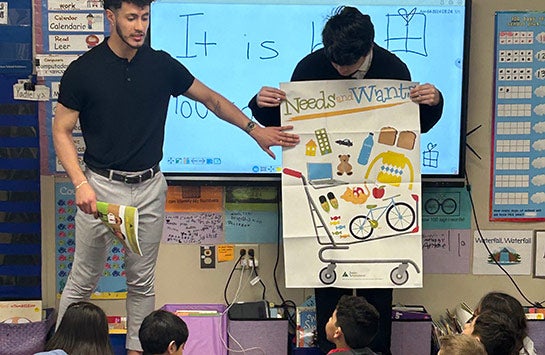
Is the BA 320 Civic Engagement volunteer service project a new initiative?
It’s an existing initiative. BA 320 Civic Engagement is an eight-week class. In addition to classroom instruction, assignments, and homework, students are deployed to local nonprofits where they complete 7 to 10 hours of volunteer service. When the pandemic struck, the volunteer service was dropped as all instruction went online. We piloted a reintroduction of the volunteer service component last fall. Last spring, the volunteer service was fully reintroduced to the class.
Changing Communities Through BA 320: An Overview of Student Impact Featuring Cordelia Callaway of iLEAD PDP
What was the idea behind establishing a service component for the class?
The service component provides a learning opportunity outside of the classroom. It allows BA 320 students to go into another person’s world to understand challenging issues that impact people every day. Services for the unhoused or places that provide food for people where there are food
disparities: These are opportunities for the students to experience the importance of nonprofits and the way in which their volunteer service helps nonprofits fulfill their mission.
There are also some organizations that the students lend their expertise through guided virtual projects. For instance, BA 320 students helped create an online virtual mall for small businesses in North Lawndale through their work with a local nonprofit.
Changing Communities Through BA 320: An Overview of Student Impact Featuring Cordelia Callaway of iLEAD PDP
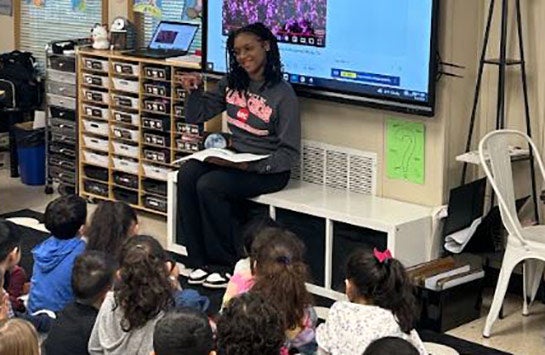
Do students choose their volunteer project or is it assigned to them?
Each instructor has their own method for assigning student volunteer service and some student choice is involved. Students are introduced to the volunteer service providers on the first day of class and are divided into volunteer service teams of six to eight students per group. Each team is partnered with the nonprofit or nonprofit project that they’re going to be working on.
They don’t volunteer as a group because their schedules are different. They complete their service individually. If they’re working on a virtual project, each student is responsible for certain aspects of the project as decided by their team.
Changing Communities Through BA 320: An Overview of Student Impact Featuring Cordelia Callaway of iLEAD PDP
What qualifies a nonprofit to be an ideal partner for BA 320?
Prior to the pandemic, I reached out to organizations based on the instructors’ topics of interest. For example, I researched local nonprofits that provided social services to immigrants. From there, I reached out to those nonprofits and asked if they were interested in hosting a team of our student volunteers. Erie Neighborhood House became one of our first nonprofit service providers this way. We continue to build relationships with nonprofits that address critical community issues.
Changing Communities Through BA 320: An Overview of Student Impact Featuring Cordelia Callaway of iLEAD PDP
What are PDP’s expected outcomes for the students who participate in these service projects?
The course emphasizes informed citizenship. You can’t be an informed citizen if you don’t understand the daily issues that impact the lives of people. The second emphasis is how involved citizenship impacts those areas. It’s one thing to read about something that’s happening. It’s a vastly different thing to become involved and lend one’s volunteer support to an organization that improves the outlook for those in need.
For business students who desire to work for a company or corporation, social responsibility is an important part of business culture. BA 320 students gain first-hand experience of the impact of active social citizenship and how they can be a positive change agent.
Changing Communities Through BA 320: An Overview of Student Impact Featuring Cordelia Callaway of iLEAD PDP
“I was struck by how many different ways students were able to make an impact. It seemed to me that, no matter what kind of person you are, you can find a way to contribute that aligns with your needs and interests.”
Changing Communities Through BA 320: An Overview of Student Impact Featuring Cordelia Callaway of iLEAD PDP
Can you describe the JA component of the projects? What is the purpose of BA 320 students’ participation on that front?
Our BA 320 JA student volunteers provide financial literacy education to elementary school students. Our student volunteers love it! They are thrilled to participate in JA. JA volunteers complete a training session led by Junior Achievement representatives. Each grade level has a different financial literacy theme, and volunteers are familiarized with their JA kit (lesson plan) during the training session.
There are many benefits to volunteering for JA. If a student volunteer is reluctant to get up in front of people, they gain valuable presentation experience before a receptive and enthusiastic audience—elementary school students. Another benefit is networking with other BA 320 students. We pair the student volunteers in teams of two so students get to know their fellow student (co-facilitator). And of course, the elementary school students are always excited to have our student volunteers because someone new is presenting new information that is informative and fun!
Our BA 320 students receive rave reviews from our host teachers and schools. We’re very excited to continue our partnership with Junior Achievement of Chicago.
Changing Communities Through BA 320: An Overview of Student Impact Featuring Cordelia Callaway of iLEAD PDP
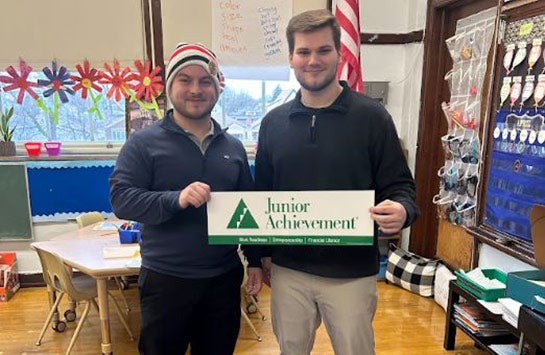
Tell us about the impact that this year’s volunteer service projects, including Junior Achievement, had. How did you notice it impacting our students?
It’s a transformational experience. The service component exposes students to new experiences and empowers them to be positive change agents. It takes students beyond their own silo and gives them the opportunity to contribute their talents and abilities in real time. Hopefully, they will remain mindful of these experiences as they progress through their business careers. For students who work on guided virtual projects, they gain valuable experience contributing to and completing a team project. Both contribute to students’ professional development.
Changing Communities Through BA 320: An Overview of Student Impact Featuring Cordelia Callaway, Assistant Director of Student Professional Development, iLEAD PDP
“Many of my students have called, texted, and spent time with me after class or even over a quick lunch to explain the impact that their volunteerism had; Recently, a student who volunteered with JA was very moved by his experience and came away hoping to contribute to early childhood education. In that same small group, another student was super excited about designing more educational games for understanding and using money. These are examples of what I call “having impact everywhere.” Those we give to and those of us who give!”
Changing Communities Through BA 320: An Overview of Student Impact Featuring Cordelia Callaway of iLEAD PDP
Talk to me about the nonprofits that the students served. What were some of the benefits that the nonprofits gained from this year’s projects?
Nonprofits benefit from the diverse skillsets that BA 320 students bring to their volunteer experience. They are overwhelmingly positive about the students’ contributions. It’s also beneficial for nonprofits to host student volunteers who have fresh perspectives.
We encourage student volunteers to contribute new ideas, and if they see a better way to do something, to say, “I think I have an idea on how we can improve this particular process.”
Changing Communities Through BA 320: An Overview of Student Impact Featuring Cordelia Callaway of iLEAD PDP
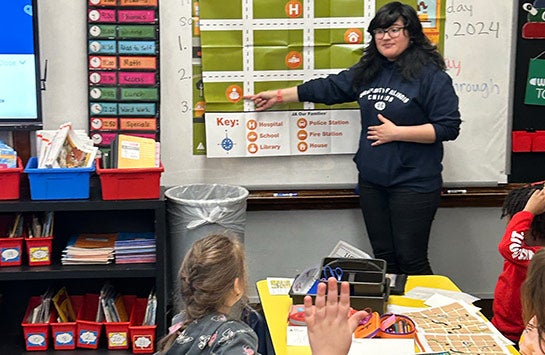
How is the success of each service project measured? Are students required to complete some sort of reflection piece or activity?
Each group creates a public service announcement (PSA) for the nonprofit where they volunteered as their final project. The PSA describes the mission of the nonprofit organization, the community issues and people it serves, and its importance to the community. Students include their perspectives about volunteering for the nonprofit.
Changing Communities Through BA 320: An Overview of Student Impact Featuring Cordelia Callaway of iLEAD PDP
For students who are interested in enrolling in BA 320, what qualifications must they meet?
This is a required class within the College of Business Administration for students with third-year standing.
Changing Communities Through BA 320: An Overview of Student Impact Featuring Cordelia Callaway of iLEAD PDP
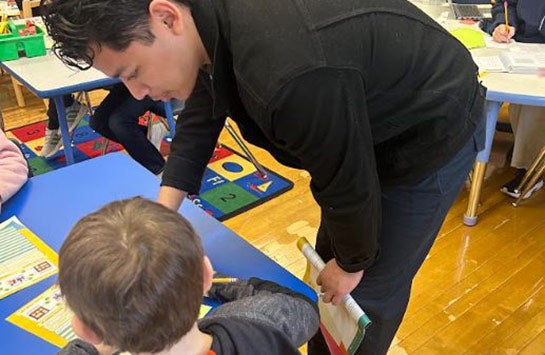
Is there anything else that you would like to mention about this year’s BA 320: Civic Engagement Volunteer Service Project?
One of the things that I continue be amazed at is how talented these students are. And not just talented, but dedicated in terms of what they’re doing. We had a group that worked with UIC Sustainability, and one of the projects that they worked on was the bottling stations that are in all the buildings. They were doing things like making sure that the recycling bins in all the buildings were accurately marked, because all that impacts the way that we reduce waste. And the way that we contribute to the sustainability of not just the campus but to the planet. As a result, UIC Sustainability responded by saying, “We can use this in our reporting.”
We had a student group that worked with the Pop-Up Pantry for the UIC Wellness Center. They did a food drive, and it was very interesting. One of the students that worked on the project was a recipient of the food pantry. That person used the food pantry to source food. This was an interesting discovery made by the other people who were on the team. It was a pivotal moment of learning because it’s tied into what we’re trying to do. We’re trying to expose people to what’s happening in other people’s worlds. This means that, as a student, you could be sitting next to somebody who needs food. You could be sitting next to somebody who needs housing. You could be sitting next to somebody who needs clothing. And so, bringing these issues to the forefront and then allowing students to participate in helping is just all positive.
It’s really refreshing to see their enthusiasm, their participation, and then also, their talents being used for something like the virtual mall that they created for the small business groups over in North Lawndale.
It’s also a testament to the education that they’re receiving through UIC Business. I think that it will help make them more marketable in their career search. In addition to studying business, these are students with a civic engagement IQ. This makes them much more well-rounded and gives them an advantage.
Changing Communities Through BA 320: An Overview of Student Impact Featuring Cordelia Callaway of iLEAD PDP
To learn more about BA 320 Civic Engagement, please visit the UIC Catalog.